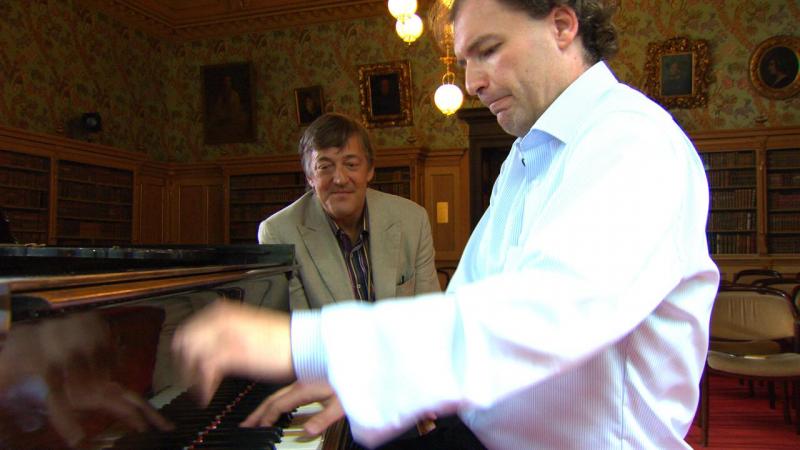Stephen Fry on Wagner, BBC Four | reviews, news & interviews
Stephen Fry on Wagner, BBC Four
Stephen Fry on Wagner, BBC Four
The polymath goes to Bayreuth to explain the anti-Semitism

Is there anywhere Stephen Fry will not go? I mean in documentaries. We’ve had Fry on depression and Fry on America, Fry on HIV and Fry on endangered species. Movingly, we’ve had Fry on who he thinks he is, an odyssey in which he discovered that much of his family fetched up in the gas ovens. Fry on Wagner? Admit it, you weren’t surprised. You didn't think, not another bloody comedian investigating, in pursuit of ratings, a subject of which he knows next to nothing.
The thrust of this instalment of BBC Four’s Opera season was to introduce Wagner to newcomers. Fry was of course the perfect choice for this sort of work, as he has long been positioned as elitism’s best apologist. People will take a lecture on Der Ring des Nibelungen from the voice of the Harry Potter audiobooks. There was even an echo of Rowlingsland here. When a picture of Wagner’s most infamous fan appeared on screen, Fry referred to the Fuhrer merely as “Him”, much as in Hogwarts they call you know who "You Know Who".
It’s a function of Fry’s supreme intellectualism that he’s forever half-sweeping it under the carpet
Since Who Do You Think You Are? Fry has been in touch with his Jewishness - or at least in touch in public, which is where the nation’s Tweeter-in-Chief mostly seems to live. So in this tour of the Wagnerian horizon there were the expected trips to Bayreuth and (pictured below) Mad King Ludwig's folly Schloss Neuschwanstein (no mention of Chitty Chitty Bang Bang, for some reason). The film followed Wagner to St Petersburg. But there was a visit to Nuremberg too, where it was argued that Nazi rallies derived their aesthetic, all banners and massed civic marches, from Die Meistersinger. Fry quietly refused to do the tourist thing of standing on the podium where Hitler frothed and foamed to the serried multitudes. In London he also went to meet Anita Lasker-Wallfisch, who as a child had survived Auschwitz because she could play the cello. Fearing the worst, his hope was to quash a rumour that the Jewish ensemble in the camp had been forced to play Wagner as the chimneys belched their evil smoke. She confirmed that they hadn't, if only because the music requires too many musicians.
The child in Fry who fell in love with Tannhaüser was much to the fore. Licensed in Bayreuth to drop in on a rehearsal of plump peroxide Valkyries in black leggings, there was wide-eyed schoolboyish excitement. “Fabulous,” he said quite a lot, plus “wow” and “this is amazing”.
He managed to score an interview with Wagner’s great-granddaughter Eva, co-chateleine of the annual Festival. When he asked her a clever-clever question - something convoluted about posterity - she looked at him doubtfully and said, “I think you create something in your mind which is perhaps not.” Has our great national treasure ever been bitch-slapped with such elegant Teutonic precision? Then she remembered she had something more important to do in the office and scarpered. All rather hilarious. Fry didn’t mind this public brush-off one bit. “Flesh on flesh I touched a Wagner,” he confided softly. “That’s pathetic of me, but it’s rather wonderful.”
 It’s a function of Fry’s supreme intellectualism that he’s forever half-sweeping it under the carpet, like a tall man who stoops to blend in. “I know it sounds pretentious and embarrassing,” he said as he put some hi-falutin notion to Lasker-Wallfisch. With an expert on Wagner and the Nazis, he voiced a fantasy he described as “pathetic” and therefore “very me”: that he’d like to go back in history and make clear to Wagner that the Jew-hating thing would destroy his legacy, so why not just drop it? (This is not a new thought in Fry, by the way. His novel Making History explores the consequences of going back in time and ensuring Hitler is never even conceived.)
It’s a function of Fry’s supreme intellectualism that he’s forever half-sweeping it under the carpet, like a tall man who stoops to blend in. “I know it sounds pretentious and embarrassing,” he said as he put some hi-falutin notion to Lasker-Wallfisch. With an expert on Wagner and the Nazis, he voiced a fantasy he described as “pathetic” and therefore “very me”: that he’d like to go back in history and make clear to Wagner that the Jew-hating thing would destroy his legacy, so why not just drop it? (This is not a new thought in Fry, by the way. His novel Making History explores the consequences of going back in time and ensuring Hitler is never even conceived.)
Fry’s passion crystallised most clearly when sitting at Wagner’s Steinway, where he played the so-called Tristan chord – “the cluster of notes”, he explained, “which opened the door to modern music.” A pianist rattled off bits of the Prelude and then the Liebestod to illustrate just how long it takes for that moment of dissonance finally to resolve itself. “You’ve made me the happiest man in Germany,” Fry told him afterwards. It was almost as if he’d enjoyed a tantrically postponed climax. “There’s nothing to say,” replied the pianist, more or less torching a post-coital cigarette. “No, that’s exactly the point,” agreed Fry. The pianist brooded for a moment like a bloke reaching for the poetical mot juste to sum up a tumultuous shag. “It’s extremely good music,” he concluded. They laughed happily.
And that was Fry’s conclusion: that Wagner’s extremely good music, effulgent with passion and beauty and power, is a force for good, that for all the stain of association with genocide it remains fundamentally "on the side of the angels". For those who know their Wagner, there was nothing new here. For the rest of us, it was good work.
Explore topics
Share this article
Add comment
The future of Arts Journalism
You can stop theartsdesk.com closing!
We urgently need financing to survive. Our fundraising drive has thus far raised £49,000 but we need to reach £100,000 or we will be forced to close. Please contribute here: https://gofund.me/c3f6033d
And if you can forward this information to anyone who might assist, we’d be grateful.

Subscribe to theartsdesk.com
Thank you for continuing to read our work on theartsdesk.com. For unlimited access to every article in its entirety, including our archive of more than 15,000 pieces, we're asking for £5 per month or £40 per year. We feel it's a very good deal, and hope you do too.
To take a subscription now simply click here.
And if you're looking for that extra gift for a friend or family member, why not treat them to a theartsdesk.com gift subscription?

Comments
...
Pretentious crap....... You
...
...